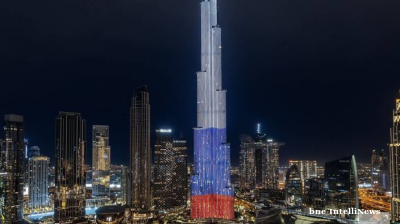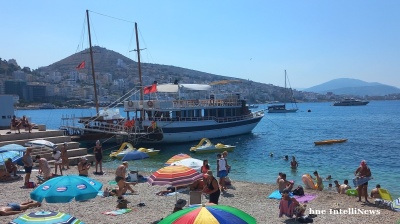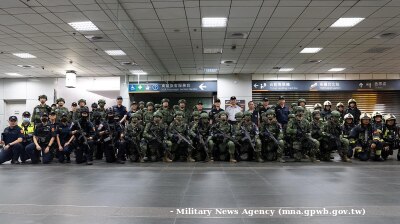After a rift with Russia and internal unrest last autumn, Abkhazia, the breakaway statelet on Georgia’s northeast Black Sea coast, is arguably in its most difficult situation since it won its de facto independence in the early 1990s.
The tiny separatist republic made headlines a few months back as dramatic protests engulfed its capital, Sukhum (known as Sokhumi to Georgians). Enraged with the government’s plan to enable Russian citizens to buy property in the republic, demonstrators seized the Abkhaz parliament building in mid-November, demanding the resignation of president Aslan Bzhania. This they duly received: Bzhania tendered his resignation on November 19, paving the way for new elections to be held on February 15, and shelving the investment law, at least for the time being.
The investment agreement that sparked the demonstrations leading to Bzhania’s downfall was only the latest chapter in a long-running saga in Abkhazia. Concerns over the loss of sovereignty by allowing Russian firms and individuals to purchase land in the republic have been a running issue for years; while Abkhazia is strongly dependent on Russia, its populace have fought hard to maintain what little agency they still possess. That made Bzhania’s December 2023 decision to force through the transfer of a long-disputed dacha (holiday home) to Russia all the more aggravating, despite the conditions attached.
“After the ratification of the transfer of the Pitsunsa dacha, we kind of started to lose hope,” says Omar Kharchlaa, a Sukhum-based activist. “We didn’t know if we would be able to mobilise so many people [in November], but eventually the protest turned out to be pretty big. People were really angry about the [investment] legislation,” he says.
While the protesters managed to achieve their immediate goals, a larger crisis is brewing: that with Russia, Abkhazia’s sole international patron.
Support from Moscow has long been critical for Abkhazia to function at even a basic level. Cut off from the outside world, which recognises the territory as a legal part of Georgia, Abkhazia is reliant on Russia for everything from electricity to government salaries. Almost 40% of Abkhazia’s state budget comes from Russian subsidies, with the remainder coming primarily from tourism and agricultural exports.
But Moscow has been losing patience with its protege. Frustrated by the continuing inability of local authorities to force through the investment deal, the Kremlin has reacted harshly to Abkhazia in recent months, most notably by cutting all subsidies to the republic on September 1. That has proved a devastating blow to the territory, and it was not the end: Russia then suspended electricity transfers to Abkhazia, blocked the import of Abkhaz tangerines, and halted Russian tour organisers from conducting trips to the republic. The moves harkened back to the 1990s, when Abkhazia was under a full blockade by the Commonwealth of Independent States (CIS), a loose grouping of former Soviet states headed by Russia.
“This is the worst relations between Russia and Abkhazia have been since Putin came to power [in 2000], definitely,” says Olesya Vartanyan, a longtime Caucasus analyst and researcher. “It’s not possible at all for Abkhazia to function without these subsidies. What they’ve been doing is trying all possible means to cover at least part of these costs internally — getting different local companies to give money that can cover 30% or 40% of salaries — but it’s not really working. It’s an extremely difficult situation.”
While Russia has since eased some restrictions and at least partially restored subsidies, the act itself was still a shot across the bow, Vartanyan says.
“Some tangerines are being allowed to cross now, and the situation with the tour companies is not that relevant at the moment, since it’s the low season,” she says. “But it’s more of a signal from Russia that they can do this and are willing to do it again.”
The partial easing of restrictions is also likely meant as a form of political support for Abkhazia’s acting president, Badra Gunba.
“The electricity situation [in Abkhazia] has always been bad in the winters, but this is the worst it’s been in ten years at least,” says Kharchlaa. “Russia wanted to teach us a lesson [with these measures], but after Bzhania stepped down and Gunba took over, they wanted to give him a win — as in, he asked Moscow and Moscow listened. Gunba will be running in the elections and Russia wants to show that he is someone they can work with. They artificially created this [energy] crisis, and now they’re trying to show that he is the only one that can get things done.”
While the investment law controversy is nothing new, it has taken on a more existential character in light of recent developments. As the ruling Georgian Dream administration in Tbilisi, under the guidance of de facto leader Bidzina Ivanishvili, has continued its rapprochement with Russia, anxiety has grown in Abkhazia over what that might mean for the separatist republic's fate. The de facto state watched as Russia stood aside and allowed Azerbaijan to conquer Nagorno-Karabakh, another erstwhile breakaway state in the South Caucasus, just 17 months ago. While military force from Georgia is not likely to be on the table, the investment law would allow another pathway: Ivanishvili is a Russian citizen, which would enable him to simply buy up much of the republic if he so desired.
With Abkhaz society dead-set against the investment law and Russia seemingly insistent on having it passed, it’s unclear what possible way there is out of the crisis, already the worst between the two sides in decades.
“It’s really very difficult for me to say [how this crisis can be overcome],” Vartanyan says. “From Moscow’s point of view, they feel like they have already softened their position [on the issue], and it didn’t work. We can see that right after this law was refused, Abkhazia started to experience the problems with electricity. The space for negotiations is very small. It doesn’t look good,” she admits.
Although Abkhazia finds itself in an incredibly difficult position, with no clear path out, there is little sign of anyone considering an easing of relations with Georgia, as Ivanishvili suggested when he claimed Abkhazia and South Ossetia would be ‘reintegrated’ just prior to Georgia’s October election.
“Not at all,” says Kharcilaa, when asked if there’s any room for Abkhazia to compromise with Georgia. “Neither side [in Abkhazia] is even considering it. The opposition says that we need someone stronger who can negotiate with Russia as an equal partner. I’m not sure if they will succeed with that, but for sure, no one is considering Georgia as an alternative.”
Meanwhile, violence is never far beneath the surface in Abkhazia, as an incident last month showed. On December 19, parliamentarian Vakhtang Golandzia was shot dead inside the Abkhaz parliament building itself — an incident that harkened back to the petty and political violence that engulfed most of the South Caucasus in the 1990s, but that the rest of the region has long since moved on from. Not so in Sukhum, Vartanyan says.
“Abkhazia is a place where everyone has guns, and people resolve their problems not through the courts and police, but through their own methods,” she says. “The state has not been able to establish functioning state structures in over 30 years now, and the locals have kind of gotten used to it. So with everyone having weapons, it also means that there is no possibility for police to crack down on protesters, because everyone understands that it can lead to more violence. The fact that someone can even bring a gun into parliament and shoot someone else there demonstrates how little control the state has.”
As the bullet-scarred buildings, damaged over three decades ago and still in such condition, in downtown Sukhum testify, Abkhazia is not a place where much changes. Unfortunately for its residents, its dual crises — both domestic, and with Russia — seem unlikely to be resolved anytime soon.
Features
KSE: Ukraine is facing a $53bn budget shortfall, but economy is stable for now
Ukraine is in urgent need of additional financing from partners as the continuation of the war drives up defence spending and reconstruction needs, jeopardizes budget financing, weighs on the balance of payments, and slows economic growth.

PANNIER: Ruling family’s ‘palace in the sky’ cruel sight for Turkmenistan’s poor souls down below
Photos posted of renovated Boeing by US makeover manager offer further insight into "ultra-luxurious" world enjoyed by Berdimuhamedovs.

Russia tax service targets Russian accounts in UAE
The Russian Federal Tax Service (FTS) has ramped up its scrutiny of Russian nationals holding accounts in the United Arab Emirates, following the effective implementation of automatic tax information exchange between the two countries.

INTERVIEW: Can Albania’s tourism miracle last?
As social media brings in the crowds, the head of the Albanian Tour Operators Association tells bne IntelliNews Albania should turn away from mass-market tourism and focus on higher-value offerings.




